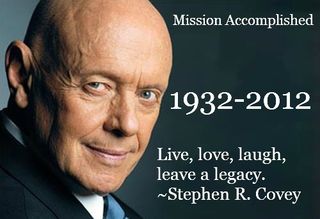Last week, I ventured out to the golf course alone, and was paired with three twenty-something guys who looked to be a polite and pleasant group with whom to play a round of golf on a beautiful Seattle summer day. Unfortunately, one of the three spent the entire round on his iPhone. If he wasn't texting, he was accepting, or worse, making calls. On four occasions we all had to wait several minutes for him to end his calls before he addressed his ball. While I would typically say something, I was curious to see if his friends would ever confront their friend on his rude and distracting behavior. They never did.
Since that round of golf, I encountered the following article from Michael Hyatt that addresses some of the recent science around internet usage and its impact on us. It offers some very helpful suggestions to guide our use. In it, he refers to a Newsweek article of the same name:
"A few years ago, people were ridiculed for suggesting that the Internet was having a negative impact on our minds. But, now the proof is starting to stack up.
'The first good, peer-reviewed research is emerging, and the picture is much gloomier than the trumpet blasts Web Utopians have allowed. The current incarnation of the Internet—portable, social, accelerated, and all-pervasive—may be making us not just dumber and lonelier, but more depressed and anxious, prone to obsessive-compulsive and attention-deficit disorders, even outright psychotic. Our digitized minds scan like those of drug addicts, and normal people are breaking down in sad and seemingly new ways.'
The problem is that we are continuously connected. Thanks to smart phones and other technologies, we have almost become cyborgs—creatures that are half human, half machine.
Here are some interesting facts from the Newsweek article:
- On average, Americans stare at some type of computer screen for eight hours a day.
- When President Obama ran for office last time, the iPhone had yet to be launched.
- Now smart phones outnumber regular ones. More than a third of users get online BEFORE they even get out of bed.
- The average person, regardless of age, sends or receives about 400 text messages a month—four times the 2007 number.
- The average teen processes an astounding 3,700 texts per month, double the 2007 figure.
Again, quoting from the Newsweek article,
'Altogether the digital shifts of the last five years call to mind a horse that has sprinted out from underneath its rider, dragging the person who once held the reins. No one is arguing for some kind of Amish future. But the research is now making it clear that the Internet is not ‘just’ another delivery system. It is creating a whole new mental environment, a digital state of nature where the human mind becomes a spinning instrument panel, and few people will survive unscathed.'
New brain scan technology shows that our brains are being rewired. Heavy Web users have fundamentally altered prefrontal cortexes. The brains of Internet addicts, it turns out, look like the brains of drug and alcohol addicts. Even worse, Chinese researchers have shown that our grey matter—the part of the brain responsible for the processing of speech, memory, motor control, emotion, sensory, and other information—is shrinking or atrophying.
Numerous studies show that the more a person hangs out online, the worse they are likely to feel. Web use often displaces sleep, exercise, and face-to-face exchanges, all of which can lead to loneliness, a sense of isolation, and depression."
Michael offers three possible responses:
- "Withdrawal. You just “Go Amish,” delete your social media accounts, and swear off the Internet.
- Immersion. You shrug your shoulders, give up, and keep marching with the lemmings right over the cliff.
- Moderation. You become intentional about your Internet usage, understanding that it’s a double-edged sword."
In addition he offers these five helpful positive disciplines to aid you in avoiding the dangers of over-saturation:
- "The discipline of rest.
- The discipline of reflection.
- The discipline of reading.
- The discipline of relationships.
- The discipline of recreation."
I'll add two more to this list:
6. Embrace the present: When you are around the company of others, focus on them and the interaction, rather than focusing on someone else who isn't even there (especially those with children);
7. Know the legacy you'd like to leave. To do our jobs well, many of us need to interact on the computer much of the day. But, remember to ask yourself…What impact do I want to leave on this world? If it's posting the most exciting pictures of your fabulous life and spending the day peering at the lives of others, you will probably miss some interesting, real, face-to-face interactions.
I want to emphasize that we all must embrace to varying degrees the new technologies of staying connected, marketing and conversing with our target audiences. But, don't forget to also stay connected in a real and present manner, as it may change your brain and your life for the better.
 Editor's Note: This article was written by Dr. David Mashburn. Dave is a Clinical and Consulting Psychologist, a Partner at Tidemark, Inc. and a regular contributor to WorkPuzzle. Comments or questions are welcome. If you're an email subscriber, reply to this WorkPuzzle email. If you read the blog directly from the web, you can click the "comments" link below.
Editor's Note: This article was written by Dr. David Mashburn. Dave is a Clinical and Consulting Psychologist, a Partner at Tidemark, Inc. and a regular contributor to WorkPuzzle. Comments or questions are welcome. If you're an email subscriber, reply to this WorkPuzzle email. If you read the blog directly from the web, you can click the "comments" link below.













